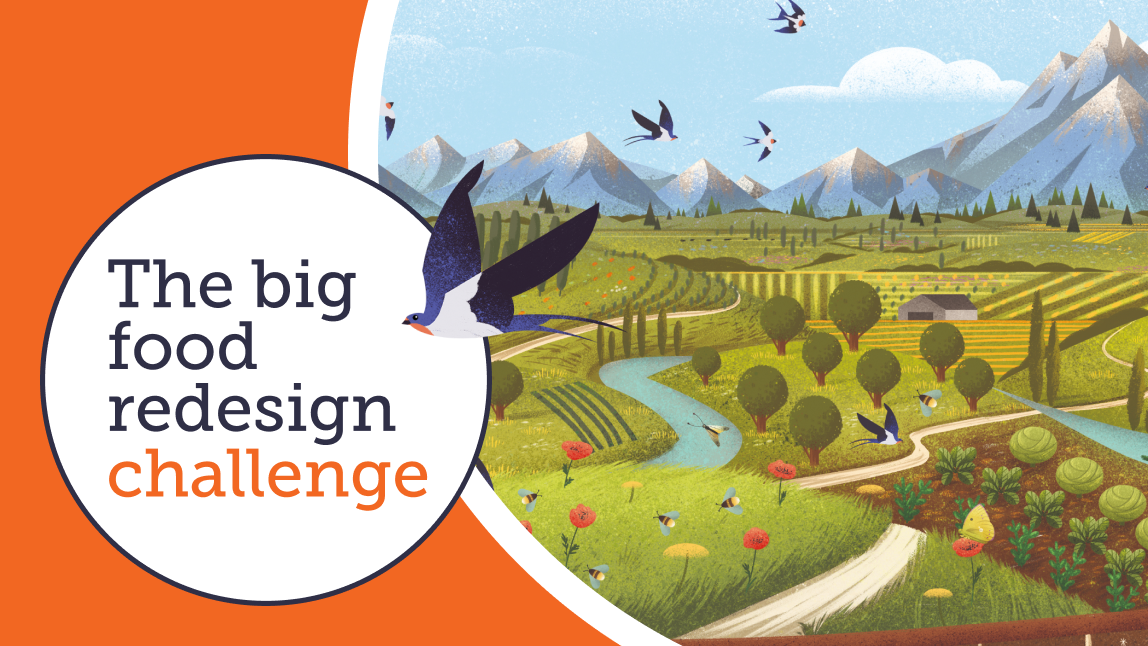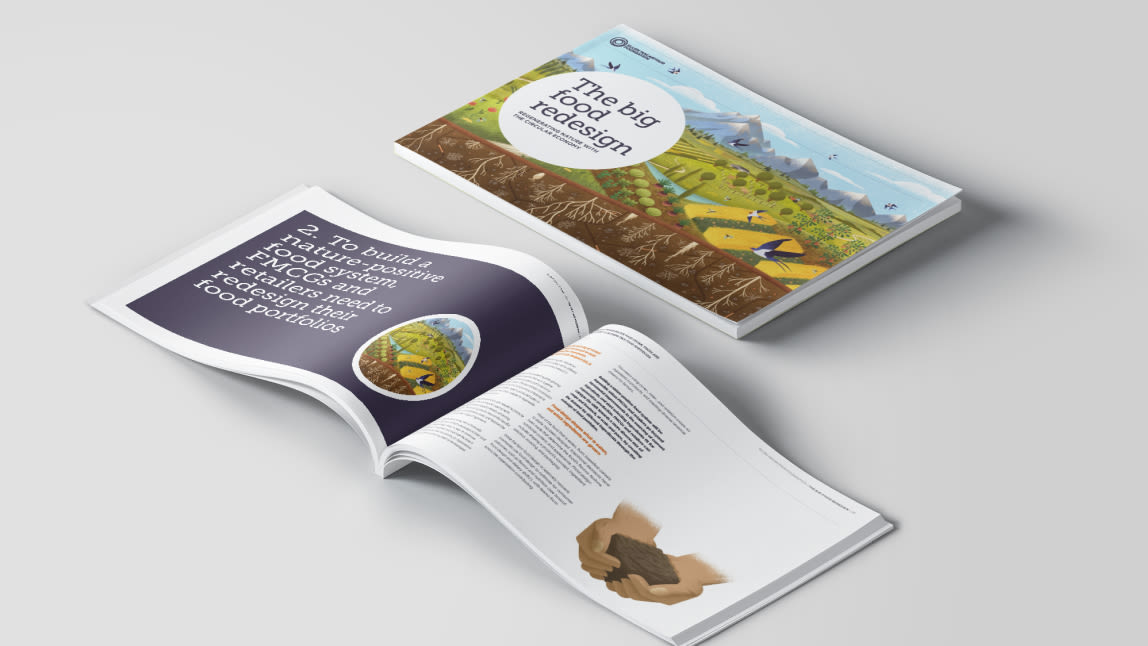What if there were no bad choices in your shopping basket? What if every bite of food had been designed in a way that helped to regenerate nature?
In this episode, we hear from Waitrose and Natoora about the steps they’re taking towards a circular economy for food.
This episode was supported by players of People’s Postcode Lottery.
Find out more about our guests
Transcript
Episode 110 transcript
Pippa Shawley 0:05
Imagine you’re at the supermarket. Let’s say you’re planning to make a stir fry for dinner. What if everything you put in your basket had been produced using the principles of a circular economy? Maybe your noodles are made of a different kind of wheat, perhaps your peas were grown both as a crop and to replace nitrogen in the soil, and your sauce is made from upcycled fruit peel and forgotten herbs and spices? And all of it had been regeneratively produced! Or maybe you’re not in the supermarket at all. Perhaps all the ingredients have been delivered to your home. Or you might have picked them up from your local farmers market. Wherever you choose to buy your food, what if there were no bad choices? What if every bite of food had been designed in a way that helped to regenerate nature? In this episode, we’ll meet two companies on the journey to try and make this a reality. Welcome to the Circular Economy Show Podcast. I’m Pippa Shawley. Over the last 3 episodes, we’ve heard that we need to change our food system to address issues such as biodiversity loss and greenhouse gas emissions. But what’s in it for businesses? Over to the Ellen MacArthur Foundation’s Food Lead, Reniera O'Donnell:
Reniera O'Donnell 1:14
I guess, Pippa, the easiest answer to that is to say, well, with no soil and no nature, there will be no business, you know, we, we are losing soil, we're losing biodiversity, if we're going to continue to feed the planet, we absolutely have to keep the planet healthy.I think one of the big things that's coming down the line is that, you know, the raft of legislation and costs and policies around organisations' impact on the environment. And if they don't address that, some of the financial challenges that are going to come along, then so I guess there is that piece around saying in the short term, we're seeing increasing pressure being put on companies to make more nature positive changes, and to have a better influence on the planet. And that's starting to come with costs attached to it. So by thinking ahead and thinking about, okay, how do we, how do we rethink our product portfolio and our ingredient portfolio to start working with farmers and start thinking about future planting seasons, there'll be starting to get ahead of the curve.
Pippa Shawley 2:20
So let's hear from a business. Founded in 1864, the John Lewis Partnership comprises the department store chain John Lewis, and Waitrose supermarkets, which has more than 300 stores throughout the UK. Benjamin Thomas, Partner & Senior Environment Manager at the Partnership explains the value they see.
Ben Thomas 2:39
Oh there's a huge amount of benefits, essentially, you know, a lot of this boils down to security of supply, and above all else, as well. So ensuring that we can sustain that the practices that they are, that are currently doing beyond the sort of two, three year window that we might be working towards. So ensure that there's huge amounts of benefits from hopefully the farmer but also from, from our perspective, the supermarket. So we can, we can obviously ensure that we have security of supplies, so there's that those those seasonal changes. And those other sort of pressures that we see that have traditionally made it quite a sort of a peak and trough approach to growing and supplying. Those will never change. But it does mean that we can hopefully, I say hopefully, we can stave off some of the the impacts that will be associated with climate change and other long term impacts. So this huge amount of benefits for all if we get it right, and getting it right is really quite tricky.
Pippa Shawley 3:48
SSo what is the company doing to commit to producing nature-positive food?
Ben Thomas 3:52
So as a business, we've always had the environment at the sort of the centre of what we do for for many, many years. or a long time, we've sort of sort of been working with our farmers to understand what more we can do, very, very conscious that everything that we've sourced, everything that we sell has an environmental impact. And also, we also have a responsibility, therefore, to make sure that it's sourced responsibly, but also, is produced the best thing the best it possibly can be. We've been sourcing from a Waitrose perspective, and all our fresh produce if it's grown in the UK, is LEAF marque. So if you're not familiar with that, it's a particular high standards for sourcing of produce to environmental standards. So that's looking at water, soil management, etc, etc. So that's been that's been, we've been committed to that for a number of years in fresh produce. But we're also looking at regenerative agriculture in a in a large way at the moment. So what more we can do to introduce more regenerative agricultural farming practices in our in our supply chain, and that will support a number of elements, mostly around our carbon commitments or Net Zero commitments, but also our commitments to biodiversity, as we start to look and think about what an SBTN (Science Based Target for Nature) will be for the business. So there's a huge amount going on.
Pippa Shawley 5:16
The partnership has its own farm, the Leckford Estate in Hampshire in southern England, which it has been using as a testbed for producing food regeneratively for a number of years. Through crop rotation and other methods such as grazing cattle, the partnership says it’s sequestering over 2,500 tonnes of carbon per year in the soils at the farm. Benjamin believes that it’s crucial to understand what is going on at farm level in order to make nature-positive food.
Ben Thomas 5:43
Yeah, well I mean the greatest our greatest impacts sit in what we call tier three, which is down at farming level. So we're pretty confident that the data that we're seeing it really is around farm levels. So it's really important we address everything from the feed that the cattle's... the feed the cattle are given right through to where that where that that that that crop or what type of crop is being produced. So we know, we know our hotspots, essentially, the areas that we need to improve on and it's especially delivering on that. But clearly there is a huge amount of impact in the supply chain at multiple points. But again, we have to be quite strategic and smart around what we what we tackle, we can't tackle all of it simultaneously. So it's really working on on those major major hotspots on a farm level slash tier three, is where we're putting a lot of time and effort because we know that's where our greatest impacts hits from, from a carbon perspective.
Pippa Shawley 6:44
While farming is a significant focus for Waitrose, Benjamin says there’s a growing opportunity to engage with suppliers about using the other elements of a circular economy for food. He points to Rubies in the Rubble, who we heard from in the last episode, as a good example of this kind of product already on Waitrose’s shelves.
Ben Thomas 7:01
Yeah, there's loads of some really good brands that have done really well over the years. And so a good example would be Rubies in the Rubble, which you may have come across. So so sauces, and so on and so forth. You've got Dash Water, who've done a great job. And you've got Discarded as well, which an alcohol business that use discarded surplus food. So there's loads of really good examples out there that have, have done brilliantly to scale up as they have. But for me, there's a huge opportunity to look further in our supply chain and say, Well, okay, what what is going on? Where is there potentially surplus? If there is, can we support you trying to get that back into the human food chain. And so, you know, that has been a real focus for us over the last couple of years in particular, so what we call whole chain plan. So really looking down the supply chain and deciding what opportunities there are, then trying to bring us that surplus and put it back into product or find exit routes for it. We talk about biochemical feedstocks a lot. And that's probably for us the most challenging area, but getting it back into product is for us is the holy grail during that during that produce, let surplus through and getting it in market we see as a great opportunity, although it's... although challenging, and really, really can be challenging at times when you factor in the seasonality, availability and so on and so forth. But it is possible, I believe, anyway.
Pippa Shawley 8:35
Another business that supplies a number of Waitrose stores is Natoora. I went to London to meet the company’s Head of Food Programmes, Roane Rapson, to learn about the opportunities and challenges of selling food that is radically seasonal. .
Roane Rapson 8:52
So Natoora was founded coming up to 20 years ago. In London. We are now a wholesaler, supplier, retailer and manufacturer. First and foremost, we source for flavour, there's been a considerable degradation in the value that people place against food. And we believe that by sourcing through flavour, we have a trickle down effect on how food is grown. And we can fulfil our overarching mission that is essentially to revolutionise the food system.
Pippa Shawley 9:29
One way Natoora aims to source the best flavours is by thinking about what Roane describes as ‘micro seasons’, working directly with producers to determine when produce is in its prime.
Roane Rapson 9:40
As a grower or a farmer, the weather, the climate, the quality of the produce, and the flavour is not as simple as four time slots in the year. So we actually like to celebrate the seasonal micro seasons if you like and the seasonal changes throughout and the biodiversity that flourishes. If you taste a perfectly grown in season, orange or a peach, the flavour really is quite radical. And it's that seasonality and that care and love and attention that's gone into growing it that brings that flavour.
Pippa Shawley 10:15
There’s no doubt that a peach grown in season tastes delicious, but Natoora also applies its ethos of radical seasonality to its processed food items. The company supplies soup to British bakery chain, Gail’s, and also sells a range of deli goods through retailers including Ocado, Whole Foods and its own shops. Roane explains how Natoora developed a way to provide great-tasting products year-round.
Roane Rapson 10:39
We recognised quite early on that we have to work within the food system in order to change it to a certain degree, and big, big retailers, and the food system in general, likes to have a consistent product on the shelf throughout the year. It plays into consumer habits, consumer behaviours, etc. So, for example, one of our products that perhaps isn't quite so familiar a Muhammara, which is traditionally a roasted red pepper and walnuts dip of Levantine origin. We, in the summer, we get absolutely fantastic red peppers from Italy. They're sweet, they're luscious, we roast those, we peel them by hand, and we blend it with beautiful creamy walnuts into a fantastic dip. However, when when the months get colder, those peppers are no longer available. And if we wanted to get our hands on and we will be buying a industrially grown pepper that lacks the flavour and integrity that our summer peppers do. But that left us with the problem of one: losing those sales with what has become a customer favourite in our range. And, and two: not keeping up with a regular product on the shelves for the retailers that we work with.
Pippa Shawley 12:08
Those are pretty important problems. So what did they do about it?
Roane Rapson 12:12
So we tweaked the recipe slightly under the same product name, to use a dried pepper throughout the colder months and switch and interchange between the two throughout the year. We found that that approach actually worked incredibly well. So we rolled that out into a few other products that we manufacture to give us that that... to stay true to seasonality but also provide a consistent product.
Pippa Shawley 12:42
So we’ve talked about the benefits for business, but as Roane has mentioned, creating a new, collaborative dynamic with farmers is essential to ensure our food system works for everyone and the environment. Beyond changing the relationship between producers and retailers, Reniera points to modelling done around a few key ingredients for the Foundation’s Big Food Redesign report to explain the benefits for farmers
Reniera O'Donnell 13:07
You know, our modelling in the report shows that, not only if we, if you, if you use the circular design for food framework, not only is it good for reducing greenhouse gas emissions by about 70%, reducing biodiversity loss by about 50%. But actually, our total output from single hectares of land goes up massively. So I guess there's that other piece that says, We've got this hugely growing population, and everybody's worried about how to feed, you know, to have an ongoing food system that feeds the population, our modelling has shown, you know, in the UK and Europe and across a subset of ingredients, that actually total food output on the land goes up so that you can actually feed this growing population. And I guess one of the really important things and why it makes good business sense is, you know, we hear a lot around how farmers are really being pushed to produce food cheaper, and cheaper and cheaper, over and over again. And what we've seen in our modelling is that by adopting regenerative farming practices, because of a demand from business, we see farmer profitability going up by about 3000 US dollars per hectare per harvest. So I think it's a couple of things, it's it's a combination of being very forward thinking around how to build a resilient supply chain to keep your business going. But also, I guess, reacting in advance to some of those challenges that are coming down the line that will mean business becomes more financially stressed.
Pippa Shawley 14:40
As farmers adopt nature-positive design on their land, and start-ups and brands like Natoora innovate the way they use ingredients, Reniera says it is important for other brands and retailers to support this change and to use their own influence to help scale a circular economy.
Reniera O'Donnell 14:56
So we get, we get into a little argument, I won't lie, sometimes with business and they say, well, we're not going to make the changes until the consumers demand it. Now we know the consumer demand is going up, but certainly not at a rate that we would like to see. And I think certainly a lot of the rate that people feel that they can afford at the moment which is which is a whole separate challenge. But our argument back is, well hang on a second, we eat the stuff that you kind of tell us to eat, because you've marketed to us and we buy it, and we believe it. So remarket us something different, you know, teach us as consumers how to engage with a new nature positive food system through the products that you're selling us.
Pippa Shawley 15:35
Benjamin says that while Waitrose already has a reputation for selling responsibly produced food, it's vital that this is backed up in its farming and production processes.
Ben Thomas 15:45
Obviously, there'll be more and more challenge as time passes on what we're doing, how we're doing it, and what more we can be doing. There's clearly a lot of commitments in the public domain, whether that be our commitments, to the WWF basket, and so on and so forth. So we have to step up the game year on year. And I think the customers are twigging, and showing more interest in what we're doing, and basically holding us to account like never before. So there is certainly an appetite from customers.
Pippa Shawley 16:14
Benjamin believes that it is essential for businesses such as Waitrose to embrace change in order to future proof their organisations.
Ben Thomas 16:22
For us as a business, we have to do it, because it's, it's, it makes business sense, we have to ensure that we we're doing the right thing if we want to stay in business in 10, 20 years. So it's just making sure that we can converse with customers, what we're doing, why we're doing it, and what it means to them.
Pippa Shawley 16:41
To create a food system that works in harmony with nature, it’s important for businesses to innovate, as Natoora has with its ingredients. However, producers and retailers need to support this innovation. But while companies like Waitrose and Natoora are making strides to design and supply nature-positive food, they are still on their journey. It might be a complex route, but Benjamin is adamant that nature positive is the way to go:
Ben Thomas 17:07
I don't think anyone's got 100% of the answer is at the moment. But it's working towards a sort of a very more holistic approach. And I hate using that word, but is very much looking at it from from end to end. And understanding where you can provide benefits for from from both angles, both upstream and downstream. So huge amount of benefits. Ultimately, we need to do it, there's no two ways around it, we can fluff around it for as long as we want. But ultimately when we have to start making those steps, even though they might be quite difficult and challenging to start off with.
Pippa Shawley 17:39
As we’ve heard in previous episodes, individual businesses cannot fix all the issues of the current linear system alone. We need system-wide change. Reniera hints at something coming soon that she hopes will inspire more businesses to engage with circular design for food.
Reniera O'Donnell 17:57
Picking up the Big Food Redesign report and reading it and thinking it a little bit like your sort of basis of truth and and a platform on which we've, like I've said to you before, I think in previous episodes, it's not the be all and end all. And it's not the only solution, but it is certainly an actionable framework that they can take hold of, and really get that mindset shift going. So there's definitely that, you know, we've been running a series of webinars for companies to understand circular design for food, and we've had hundreds of people, which gives me great hope that people find it inspiring and exciting and want to re engage with, you know, how we design food products. But I think, you know, in our, in the report, we talk about kind of five ways in which businesses can can kind of help further this agenda. And one of them is around developing iconic food products. And later on this spring, we are launching a global food challenge, to really engage the sector and say, you know what, we think you can do this, let's work together on a proof of concept around a range of different products, we will support those who want to engage through, we've got like a learning webinar series, we're going to have a community platform. So there's gonna be lots of ways in which organisations who want to take part can be supported. And really excitingly, we are assuring that we will showcase all of the successful products at the end of this through all of our media channels, and on retail shelves, certainly across the UK.
Pippa Shawley 19:30
So sort of hero products that people can look at and use that as a goal to change more of their business?
Reniera O'Donnell 19:37
Absolutely. And I think, you know, we are looking forward to learning along the way around what are the sticky, sticky issues, what's easy, what's not, what what is easy to change, and what's difficult to change. And we will then turn that into some tools and guides and frameworks to take back out to the sector and say, Look, you know, you we've done this, we've proved that it's possible. Now we can change the system.
Pippa Shawley 20:00
In our final episode of this series, we’ll be expanding on this and looking at how we can scale change. We’ll hear about the role policymakers can play in enabling this system, and from retail giant Walmart about the steps they are taking to bring nature-positive food to the masses. I hope you can join us then. Thanks for listening to this episode of The Circular Economy Show Podcast, which was supported by players of People’s Postcode Lottery. This podcast is published by the Ellen MacArthur Foundation and produced by Skinny Mammoth Media. Thanks to our contributors Benjamin Thomas and Roane Rapson.






